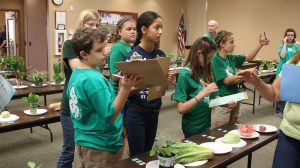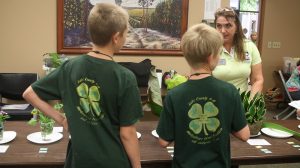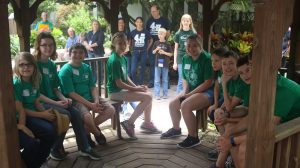 Every year, the North Florida Fair in Tallahassee, FL, becomes a vibrant hub of learning and doing for 4-Hers across North Florida. One of the standout events is the 4-H Horticulture Judging Contest. This contest is more than just a competition; it is a platform for youth to develop essential life and workforce skills. Research indicates that judging contests like the 4-H Horticulture Judging Contest play a significant role in youth development. According to a study by Rusk et al. (2003), participation in judging contests helps youth develop critical thinking, decision-making, and communication skills. These contests require participants to analyze information, make informed decisions, and articulate their reasoning, which are crucial skills for both personal and professional growth.
Every year, the North Florida Fair in Tallahassee, FL, becomes a vibrant hub of learning and doing for 4-Hers across North Florida. One of the standout events is the 4-H Horticulture Judging Contest. This contest is more than just a competition; it is a platform for youth to develop essential life and workforce skills. Research indicates that judging contests like the 4-H Horticulture Judging Contest play a significant role in youth development. According to a study by Rusk et al. (2003), participation in judging contests helps youth develop critical thinking, decision-making, and communication skills. These contests require participants to analyze information, make informed decisions, and articulate their reasoning, which are crucial skills for both personal and professional growth.
Furthermore, a study by Enfield et al. (2007) highlights that judging contests foster a sense of responsibility and self-discipline among participants. The preparation and dedication required for these contests teach youth the value of hard work and perseverance, qualities that are essential for success in any field.
Building Life Skills Through Horticulture Judging
- Critical Thinking and Decision Making:
- Participants must evaluate plants based on a set of criteria, requiring them to apply their knowledge and make informed decisions. This process enhances their critical thinking abilities and helps them become more confident in their judgment.
- Communication Skills:
- After making their evaluations, participants often need to explain their reasoning to judges. This practice helps them develop clear and effective communication skills, which are vital for any career.
- Attention to Detail:
- Identifying subtle differences between plants and recognizing symptoms of diseases or pests requires keen observation and attention to detail. These skills are valuable in numerous professional contexts, including science, healthcare, and business.
- Teamwork and Leadership:
- Many horticulture judging contests involve team events where participants must collaborate and make collective decisions. This experience fosters teamwork and leadership skills, preparing youth for collaborative environments in the workplace.
- Time Management and Organization:
- Preparing for the contest requires effective time management and organizational skills. Participants must balance their study time with other responsibilities, teaching them how to prioritize tasks and manage their time efficiently.
 The Impact on Workforce Skills
The Impact on Workforce Skills
The skills developed through horticulture judging contests are directly transferable to the workforce. Employers value employees who can think critically, communicate effectively, and work well in teams. By participating in these contests, youth gain a competitive edge in the job market.
Additionally, the specific knowledge gained through horticulture judging can lead to career opportunities in agriculture, environmental science, and related fields. The experience of participating in such contests can also enhance college applications and resumes, showcasing a commitment to learning and personal development.
Horticulture Judging Contest Content
The 4-H Horticulture Judging Contest challenges participants to evaluate various plant specimens, identify pests and diseases, and demonstrate their knowledge of plant science. The contest is divided into several categories, including plant identification, judging classes based on a set of criteria, and a knowledge exam. This structure not only tests the participants’ horticultural knowledge but also hones their analytical and decision-making skills.
Participants are given a list of plants to study in advance, which can be found on the Florida 4-H Horticulture Contest Study Guide. Additionally, they can access resources on pest identification and management from the University of Florida IFAS Extension.
The 4-H Horticulture Judging Contest at the North Florida Fair is more than a competition; it is a transformative experience that equips youth with essential life and workforce skills. By fostering critical thinking, communication, attention to detail, teamwork, and time management, these contests prepare participants for success in various aspects of life. For more information and resources, participants can refer to the Florida 4-H Horticulture Contest Study Guide and the University of Florida IFAS Extension Pest Management Resources.
As youth engage in these enriching activities, they not only cultivate their horticultural knowledge but also sow the seeds for a prosperous future, embodying the 4-H motto: “To Make the Best Better.” If you are interested in signing your child up for this program, or helping other youth prepare, contact your local UF IFAS Extension office.
References
- Rusk, C. P., Martin, C. A., Talbert, B. A., & Balschweid, M. A. (2003). Attributes of Indiana’s 4-H Livestock Judging Program. Journal of Extension, 41(4).
- Enfield, R. P., Schmitt-McQuitty, L., & Smith, M. H. (2007). The Development and Impact of an Experiential Science Curriculum. Journal of Extension, 45(4).
- Meet our Summer Intern- Andy Franklin! - June 13, 2025
- Blue Ribbon Baked Goods - September 23, 2024
- Blue Ribbon Photos and Posters - September 21, 2024
